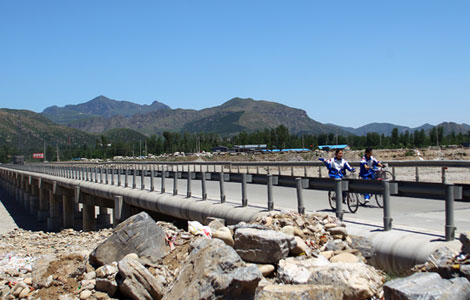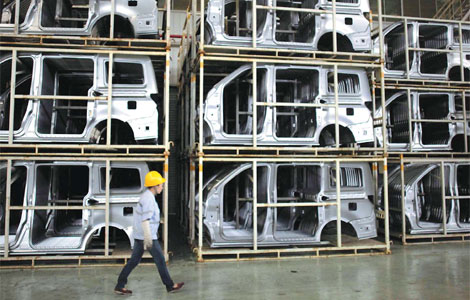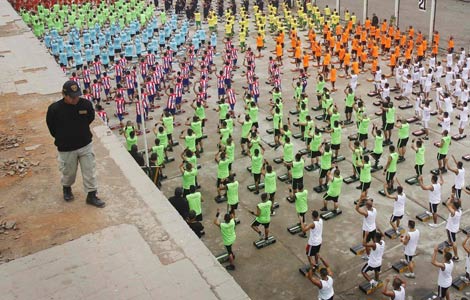Courts feel trials of global economy
Updated: 2013-06-17 01:10
By Zhang Yan (China Daily)
|
|||||||||||
Mainland judges face a growing number of international cases
Increasing globalization of the economy is leading to more legal disputes involving overseas parties, posing unprecedented challenges for the court system, a judge said.
"When investment profits fluctuated sharply, a spate of disputes erupted in small and medium-sized companies that lacked mature corporate governance structures and investment arrangements," said Liu Guixiang, presiding judge of the No 4 Civil Tribunal under the Supreme People's Court, which is in charge of overseas commercial and maritime trials.
Courts across the mainland concluded 171,000 civil, commercial and maritime lawsuits involving overseas parties from 2008 to 2012, a jump of 57 percent from the previous five-year period, Liu said. Among those lawsuits, 65,000 involved Hong Kong, Macao and Taiwan parties, he said.
The increase in disputes is also partly because of rising labor and production costs on the mainland.
Liu said there has been a shift in the types of disputes from sales, leasing, technology and joint ventures to a steady rise in cases of intellectual property rights infringements, marriages and finance, he said.
Some joint ventures paid little attention to foreign direct investment policy and government requirements.
"These joint ventures usually did not draft the joint venture contracts thoughtfully on a solid legal basis. So at a later stage during the joint venture's operation, the foreign parties can develop great differences with their mainland partners about things such as ballot calculation of the board of directors, equity allocation ratio and shareholders' remedies," he said.
Facing increasing lawsuits, courts are trying to strike a balance between heavy caseloads and achieving efficient justice, despite doubts about judicial capacity and efficiency of judges, he said.
According to Shen Hong-yu, a senior judge from the No 4 Civil Tribunal under the Supreme People's Court, disputes have involved companies from the United States, United Kingdom, Germany, some Southeast Asian and African countries, as well as from Hong Kong, Macao and Taiwan.
In transnational lawsuits, foreign parties can choose foreign law as the applicable law.
"This has posed a difficulty for judges in finding the foreign law and correctly understanding relevant laws for different countries," Liu said.
But Liu assured that the Supreme People's Court has taken measures to guarantee that only qualified courts and judges with strong academic backgrounds are permitted to try overseas-related civil and commercial cases.
The judges are also required to accept continual training for domestic and international laws, he said.
Courts will also strive for more transparency, he said.
"Publishing court verdicts online is on top of the agenda this year. Making hearings public and releasing judgments online will further promote the openness and transparency of court trials, and will foster the positive image of the Chinese judiciary," he said.
Ji Xiang, a lawyer from Beijing Fangda Law Firm, which specializes in transnational lawsuits, said legislators need to update laws to better settle disputes involving transnational companies.
David Yu from Hong Kong, who works in Beijing for the legal affairs department of a transnational company specializing in environmental materials, said the complicated administrative approval procedures should be simplified to facilitate overseas investors.
He said he hoped to see China promote judicial transparency and improve efficiency.
According to the Ministry of Commerce, the mainland attracted foreign direct investment of $111.72 billion last year, and its companies invested $77.2 billion in overseas markets.
Related Stories
Courts need to do more than deal with the media 2013-06-13 22:10
Chief justice stresses court transparency 2013-05-29 01:05
Shanghai court hears Michael Jordan suit 2013-04-28 00:31
Apple in Shanghai court over 'Siri' claim 2013-03-28 07:18
Court green-lights Sany's lawsuit against Obama 2013-03-02 20:51
Today's Top News
China condemns attack on students in France
Obama, Putin face tough talks at G8 summit
Czech PM steps down amid scandal
Policies to boost cross-Straits ties
Courts feel trials of global economy
Experts puzzled by state of economy
Exchanges key to promoting TCM
'HK laws apply to Snowden case'
Hot Topics
Lunar probe , China growth forecasts, Emission rules get tougher, China seen through 'colored lens', International board,
Editor's Picks

|

|

|

|

|

|





